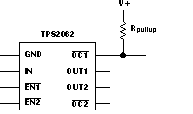SLVS490K December 2003 – June 2024
PRODUCTION DATA
- 1
- 1 Features
- 2 Applications
- 3 Description
- 4 Description (continued)
- 5 Pin Configuration and Functions
- 6 Specifications
- 7 Parameter Measurement Information
- 8 Detailed Description
-
9 Application and Implementation
- 9.1
Application Information
- 9.1.1 Power-supply Considerations
- 9.1.2 OC Response
- 9.1.3 Power Dissipation and Junction Temperature
- 9.1.4 Thermal Protection
- 9.1.5 Undervoltage Lockout (UVLO)
- 9.1.6 Universal Serial Bus (USB) Applications
- 9.1.7 Host/Self-Powered and Bus-powered Hubs
- 9.1.8 Low-power Bus-powered and High-Power Bus-Powered Functions
- 9.1.9 USB Power-distribution Requirements
- 9.1.10 Generic Hot-Plug Applications
- 9.1
Application Information
- 10Device and Documentation Support
- 11Revision History
- 12Mechanical, Packaging, and Orderable Information
9.1.2 OC Response
The OCx open-drain output is asserted (active low) when an overcurrent or overtemperature shutdown condition is encountered after a 10-ms deglitch timeout. The output remains asserted until the overcurrent or overtemperature condition is removed. Connecting a heavy capacitive load to an enabled device can cause a momentary overcurrent condition; however, no false reporting on OCx occurs due to the 10-ms deglitch circuit. The TPS206x is designed to eliminate false overcurrent reporting. The internal overcurrent deglitch eliminates the need for external components to remove unwanted pulses. OCx is not deglitched when the switch is turned off due to an overtemperature shutdown.
 Figure 9-2 Typical Circuit for the
OC Pin
Figure 9-2 Typical Circuit for the
OC Pin